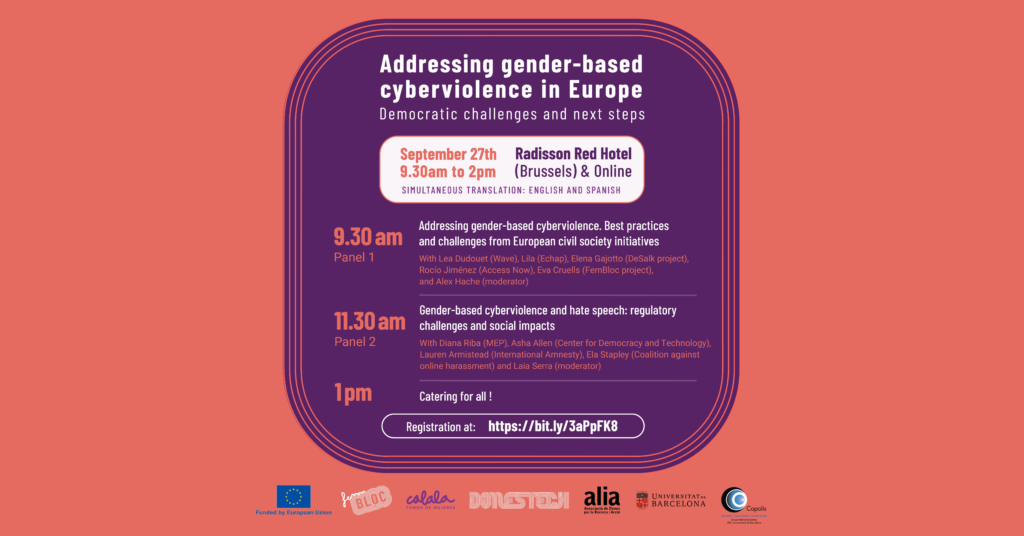FemBloc – Addressing gender-based cyberviolence in Europe: Democratic challenges and next steps
Date
Time
Location
Radisson Red Hotel
Brussels

Addressing gender-based cyberviolence in Europe: Democratic challenges and next steps
Date: 27th of September 2022
Time: 9.30am – 2pm (CET)
Brussels (Radisson Red Hotel)
Registration link before 23rd of September 2022: https://bit.ly/3aPpFK8
11.30am (CET) Panel 2 – Gender-based cyberviolence and hate speech: regulatory challenges and social impacts
With the participation of:
- Diana Riba (MEP)
- Asha Allen, Center for Democracy and Technology
- Lauren Armistead, International Amnesty
- Ela Stapley, Coalition against online harassment
- Laia Serra (moderator)
We can no longer differentiate our lives between what we do on an analogue and a digital sphere, we currently place ourselves in an offline-online continuum that defines our reality. As reflected in data and highlighted in the European Parliament’s report (Van der Wilk, 2018), digital gender-based violence (GBV) is on the rise and has significant lasting impacts on women, girls and LGBTIQ+ community. In addition, this intersects with the rise of the extreme right, neo-chauvinism and liberal capitalism, a breeding ground that favours the increase in violence. However, little is known and regulated about this violence and, similarly, digital GBV is only partially addressed in current legislations and public policies of the States and the European Union.
Due to the inherent cross-border dimension of digital GBV, the European Commission has adopted a proposal for a directive on combating violence against women and domestic violence with the aim to address this problem through a cohesive European regulation. Yet, its regulatory scope, understanding of this type of violence, its implementation, among other aspects, reflect some of its challenges. At the European level, there are also other regulatory efforts on intersectional issues related to digital GBV, such as hate speech and digital service providers, although their implementation remains unclear so far.
It is essential we focus on the personal, social and cultural impacts that this violence causes on the individuals who experience it and their environments. It affects a wide range of spheres such as the physical and psychological health, education and employment opportunities, as well as political participation and freedom of expression. As a result, this situation leads to a democratic backsliding which is reflected in the lack of public policies preventing this violence, the absence of adequate measures for victim’s reparation and the silencing of the people affected in the new public agora that is the Internet. The debate is not about removing communication and digital relationships, but about being able to experience them in a free and safe manner. We must reduce the risks from its root and be aware of its existence. For that purpose, an effective social and political commitment for the eradication of this violence is of utmost importance.
In this context, FemBloc arises with the aim of defining a model for addressing digital gender-based violence from an intersectional feminist perspective in the Catalan scope, and transfer the knowledge and good practices that emerge from the project to related contexts at the Spanish, European and international level. The FemBloc project is comprised by Alia/Donestech, Calala Women’s Fund, the University of Barcelona and the experts Alex Hache and Laia Serra.
FemBloc organises in Brussels the event “Addressing gender-based cyberviolence in Europe: Democratic challenges and next steps” on the 27th of September, from 9:30am to 2:00pm. The program will have two panels, a networking space and lunch. The first panel will share different experiences and alternatives from social movements to address gender-based cyberviolence. The speakers will share good practices and lessons learned, useful tools and challenges that have been found in the efforts to prevent, detect, address and redress this type of violence. In the same line, one of the main objectives of this panel is to provide recommendations and address key concerns on the lack of political response with a comprehensive approach. The second panel will focus on gender-based cyberviolence from its regulatory efforts and deficiencies at the national and European levels, the intersectionality with hate speech as well as the social impacts they entail.